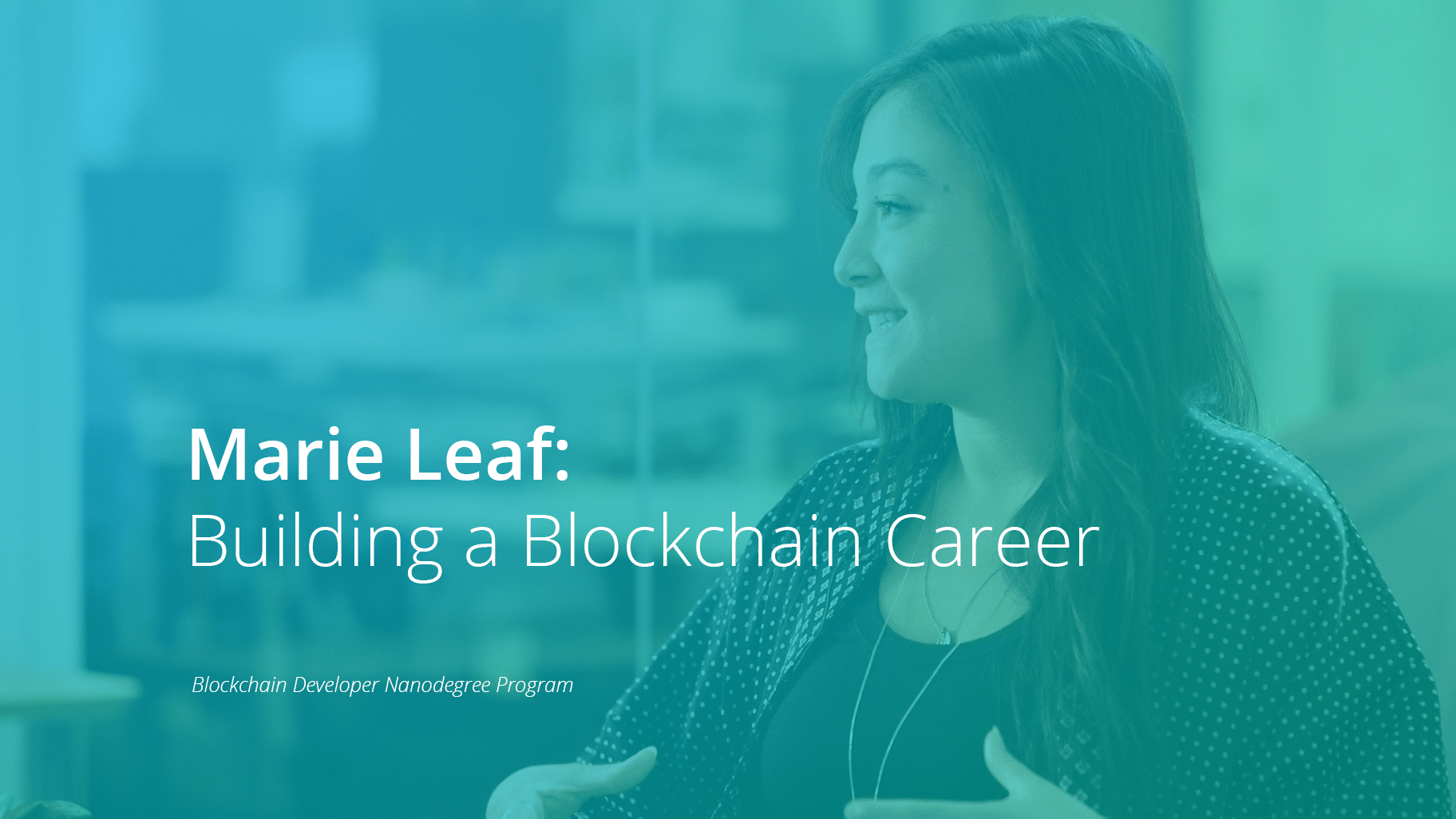How two-time Nanodegree program graduate Marie Leaf transformed her mindset, and launched a new career in a transformational field.
Marie Leaf describes herself as a lifelong Udacity learner, and we’ve been so impressed and inspired not just by her incredible thirst for knowledge and self-motivation, but by all the ways she’s connected her learning experiences to her career advancement. Marie has built a unique career path that has led her to an exciting role in the blockchain field, and in our interview below, she discusses how learning with Udacity helped transform her mindset, and how she felt empowered to pursue the technology-centric career she really wanted for herself.
~
Thank you so much for taking the time to speak with us! We’re really excited to share your story with our readers, and to explore your career journey in detail. Let’s go back in time to when you first realized that you wanted to engage in a new learning experience. Where were you at mindset-wise at that point?
I was at a point in my career where I was doing a lot of business development, and I was the venture development manager at a large systems integrator. I’d always been super excited about technology, and always very technically inclined, but I’ve always felt a little bit like I was sitting on the sidelines.
So a new learning experience was potentially a way to address that “sitting on the sidelines” feeling?
I think so. There was that little extra thing that was missing from my understanding—I wanted to understand the technology from a more fundamental standpoint, and I wanted to be more engaged with what I was selling. At that time, I was still in a more traditional sales role.
So learning new skills made a great deal of sense. But your choice to pursue an online education wasn’t an easy one, was it?
I come from a family that values higher education, and both my parents have graduate degrees from really top tier technical schools. When I told them about MOOCs, online courses, and bootcamps, there was a lot of skepticism and pushback—they kind of thought I was crazy! But I tried to explain that the nature of how learning works, and how information is shared, is definitely changing.
There were some budget issues to consider as well, is that right?
Yes, given the recession and its aftermath, I had to be a lot more pragmatic about what I was going back to school to learn. I had a lot of friends in New York who went through bootcamp programs, but from purely just a cost perspective, I wanted something that would give me what I needed, without having to go into debt to do it.
How did you discover Udacity, and what led you to decide Udacity was the right choice for you?
I can’t remember where I first heard about Udacity, but I remember learning about Sebastian Thrun, and the work he was doing training a self-driving car. I started exploring his intro courses on machine learning, and remember thinking, “Wow, he’s delivering this information in a very accessible way.” Ultimately, I just felt that Udacity offered the most efficient and most approachable way to learn this material, without having to earn degrees in math and computer science. I became fascinated, and I just fell in love with coding.
So, you elected not to enroll in a bootcamp, but you opted for a “full-immersion” approach to your learning journey all the same. That’s a bit unusual, as so many of our students come to Udacity to take advantage of the flexibility. Can you tell us about that decision?
Well, Udacity is definitely set up to be taken adjacent to when you’re working a full-time job. But for me, I wanted to just block all the time off, so I left my job.
That’s a pretty bold step.
Yes, and as I said, my parents thought I was crazy. But I told them, and myself, that I’m going to do these Nanodegree programs, and I’m going to understand these technologies, and I’m going to teach myself.
So how does blockchain come into the picture for you?
Well, all this was happening during the same time that Ethereum was launching, and back then, Udacity didn’t have the Blockchain Developer Nanodegree program, because blockchain was still so new, but my Nanodegree program experience was giving me the confidence and the toolset to know how to teach myself, to know where to go to ask questions—to know how to ask for questions.
“I just began to feel really empowered to understand that I was a creator rather than an observer.”
So, it was during the time that I was doing my Full Stack and Data Analyst Nanodegree programs that I went online and started picking up Solidity.
That’s an incredible amount of work. Two Nanodegree programs, and blockchain on top of that?
Yes, I was basically doing my own self-directed blockchain program on the side. But now it’s a formalized program at Udacity, which I’m so excited about!
So it sounds like the experience of learning within a Nanodegree program really impacted your whole way of thinking about learning, and about your own abilities?
It’s kind of hard to articulate, but I think the biggest shift was moving to a personal mindset identity of being technical as opposed to non-technical. Once I made that transition, I felt ready to be the kind a product manager that knows how to actually build things, and who knows what a product wants and needs, in terms of its internal workings.
Is that when you started looking for new kinds of roles?
After I finished my Nanodegree programs, I started applying for product management roles, and I started applying for data science roles, and ultimately, I went back to what I knew before, which was enterprise development. I joined Cognizant, which is a large systems integrator.
And it was there that you got to dive into blockchain professionally, is that right?
Yes, by that time, and on my own time, I had built my own dapp (decentralized application) with Solidity on the Ethereum testnet, and I think I had even deployed it to the mainnet at that point, but mainly, I had just done so much work with setting up IPFS, Solidity, and playing around with all the consensus mechanisms that I actually got hired on the Cognizant blockchain team, which was a very small team that serviced a 280,000 person firm.
How did your experience there inform your sense of where you wanted to go next in your career?
Well, I learned a lot there from an enterprise use case standpoint—not just the technical challenges, but also the challenges of coordinating all the actors in a large institution. It was a very good learning experience.
But it wasn’t yet where you really wanted to be? You wanted to go beyond the enterprise use case?
Yes, because right now, it’s still very nebulous on how exactly decentralized apps are going to benefit society at large, and how they’re going to interact with enterprise chains, and that’s what drew me to Kadena, where I’m now the Head of Product.
It’s really impressive how you’ve managed to successfully integrate all your interests and goals, and how you’ve independently created your own unique career path to get to where you are today, in what sounds like a dream role for you. It’s thrilling for us to have played a part in your journey.
You know, I found out shortly after joining Kadena, that none of the management team or the founders went through a traditional computer science degree program—none of them have computer science degrees. They were all self taught!
“It’s really powerful when you realize that you don’t have to have a degree from a certain institution to pursue questions around how technology is going to grow, and you don’t have to have that traditional university or college degree to invent new things.”
Udacity played such a formative role in shaping my understanding of how to learn about technical issues, and how to learn about new concepts. Before Udacity, I felt a little bit of imposter syndrome, where I didn’t really understand what was happening. Udacity gave me the skill set to learn about the first principles of what computer science is. I still go to Udacity to brush up on certain concepts, and I’m a lifelong Udacity learner.
Thank you so much for sharing your story, your insights, and your journey. You’re an inspiration to all of us at Udacity, and we can’t wait to experience all the ways you’re going to make an impact in the blockchain field!
~
When it comes to career pathing, Marie Leaf is a true innovator. She created a path for herself that didn’t yet exist. She leveraged resources such as Udacity’s Nanodegree programs, combined them with transitional career opportunities she earned along her journey, and arrived at a destination wholly of her own devising. This kind of grit, determination, and self-motivation, are the hallmarks of a committed lifelong learner, and Marie Leaf is exactly that. She is also a pioneer, learning blockchain at a professional level before opportunities to do so started becoming more widely available. Today, Udacity’s Blockchain Developer Nanodegree program is full of students eager to enter the exciting world of blockchain, eager to join Marie in exploring what this incredible technology can make possible in our world. We’re excited to see what the future holds!





